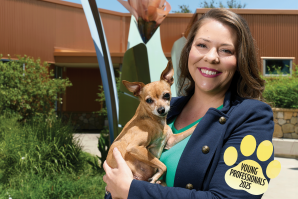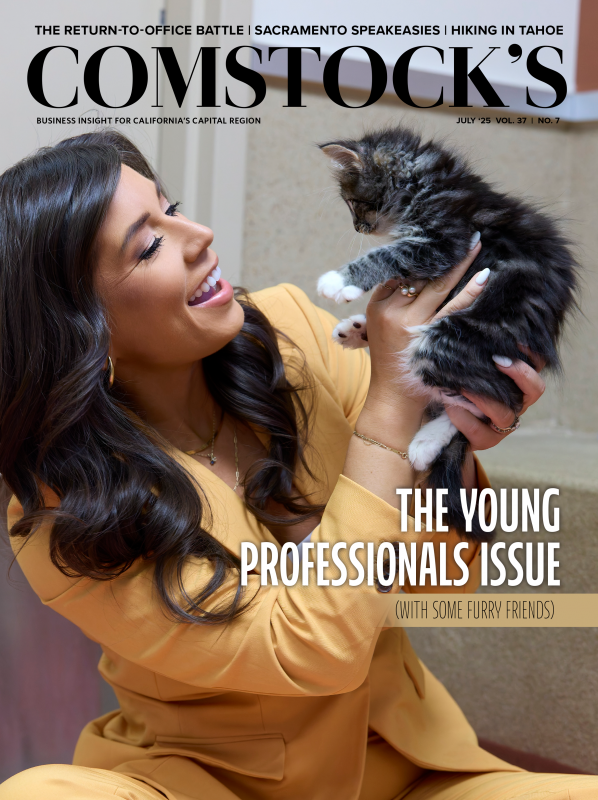We’ve heard a lot about how much lockdowns affected students during COVID, having to learn at home on a computer screen with no social interaction. Not much has been written about how the pandemic affected young professionals, who were either launching or building their careers when it began. Everything they had been taught about business was now different. They had to learn to pivot. They had to adjust to a new workforce and even a new workplace. How were they going to network when everyone had stay-at-home orders? Who was there to guide them through this unprecedented chaos?
Comstock’s was humbled by the high number of nominations we received for our 2025 Young Professionals issue. In fact, we got the most nominations ever. There are so many impressive rising stars in our region, we thought we’d ask some of the nominees their thoughts on leadership, how they spend their workday and what advice they have for others who are just starting out.
What does leadership mean to you?
Emily Penrod is owner of Moxxie Communications.

For Katie Durham, president of MetroEDGE, former vice president of member engagement at the California Manufacturers & Technology Association and currently part of Sutter Health’s communication team, leadership means leading by example. “Leadership isn’t about serving yourself — it’s about serving the people you represent.” Durham believes a leader should have a clear vision of what they want. “Vision means thinking strategically, making space for creativity, and guiding others toward shared goals.”
There are three things young leaders agree on that are important to them as leaders: authenticity, transparency and intention. They believe leaders should be authentic in who they are, transparent in their dealings with employees and co-workers, and intentional — meaning do as you say.
“To me, leadership means guiding with heart, listening with intent, and choosing compassion as a daily practice, all with the goal of making life a little better for those you lead,” says Kayla Scott, client services director at MarketSharePR. “I believe a true leader opens a door, and then holds it open for the rest to enter behind them.”
Elio Gutierrez-Montoya, Ph.D. and UC Davis lecturer, says that as an immigrant and person of color, he knows firsthand the power of having someone believe in you. “To me, leadership is rooted in empathy and advocacy. It’s about creating space for others to shine by recognizing and nurturing their unique strengths — often before they see those strengths in themselves.”
Tim Swaney is CEO of WatchUr6.

Leaders have authenticity by being transparent, approachable and grounded in who they are, fostering trust and credibility, says Elizabeth Esquivel, vice president of government relations at the California Manufacturers & Technology Association, and trustee for the Yolo Board of Education. “The last few years have reinforced that people don’t just follow titles, they follow leaders who are principled, dependable, and focused on creating lasting impact,” she says.
Kaitlin Perry, senior vice president of Perry Communications Group, believes leaders should be multifaceted. “I care deeply about the people I get to work with, and I hope to empower them by modeling compassionate, supportive, and effective management. It’s really important to me that leaders can walk the walk and talk the talk; meaning, every person — no matter their job title — should understand the core components of our day-to-day work,” she says.
What advice do you have for young professionals?
Katie Durham is president of MetroEDGE.

“Growth often happens outside your comfort zone,” says Durham. “Say ‘yes’ to the happy hour, the lunch-and-learn, joining the board, the networking event. We’re all busy and exhausted at times, but saying yes to new experiences opens doors to unexpected opportunities and relationships. Protecting your peace and maintaining boundaries is important — but so is showing up.”
Young professionals should learn to love delayed gratification, says Swaney, as the seeds being planted take time to bear fruit. “It’s not always fun, but it’s how you win long-term.”
“Focus on building real connections,” says Penrod. “The people you meet now might become mentors, colleagues or even future bosses. Just be kind and professional with everyone, because how you treat people sticks with them and can open doors when you least expect it.”
Kayla Scott is client services director at MarketSharePR.

Self-integration requires establishing routines that allow you to be your best, according to Perry. For Gutierrez-Montoya, that means starting from a place of empathy for yourself and others, and practicing self-care. “While the love of the people who make up our support system is important, it’s equally important to be appreciative and loving of yourself. I continue to have to nurture that practice. This doesn’t come easy to everyone, but it’s a practice that’s important. Be good to one another and to yourself.”
Tiyesha Watts is legislative and policy advocate for the
California Academy of Family Physicians.

Elizabeth Esquivel is the vice president of government relations
at the California Manufacturers & Technology Association.

How do you start your day, and how do you end it?
For these young leaders, how a day starts — and ends — may reveal more than their work agenda ever could. From early alarms to late-night reflection, the rituals that frame their time reveal something deeper: intention, presence and an understanding that leadership begins before the meetings and continues long after the inbox is cleared.
“I begin my day with reading and research over a cup of coffee,” says Scott, the client services director for MarketSharePR. “I dive headfirst into industry publications, current events impacting client industries … educating myself daily.” She ends with service: “Closing out the day means everyone should have the info they need to head home knowing all of their daily tasks are handled and off their plate. Ahhhh — a sigh of relief!”
For MetroEDGE President Durham, movement is key. “It’s taken years, but I’ve finally become a 6 a.m. workout person,” she says. “Exercise is essential for both my physical and mental health.” Her evenings? A mix of intention and unplugging. “I try to stick to a few constants: avoiding screen time before sleep … ending the day on a patio with good food and a glass of wine. Less screen time, more life.”
Esquivel, vice president of CMTA, begins her day at 4:30 a.m. in the gym. “That early morning discipline … sharpens my focus, strengthens my resilience.” She ends by disconnecting from work and reconnecting with home. “Whether it’s sharing conversation, helping with homework, or simply enjoying each other’s company … that time is sacred.”
Elio Gutierrez-Montoya is a UC Davis lecturer.

“I usually start my day with a workout,” says Penrod of Moxxie Communications. “It’s my way to clear my mind and set a positive, energized tone.” She ends with intention: “looking over what I’ve accomplished and (writing) out my agenda for the next day.”
For Perry, a skilled equestrian, horses help her begin the day. “I start my day every day at 6:00 a.m., either in the office or at the barn with the horses. I’m an early bird and I absolutely love being up before anyone else. It helps me feel settled and have an idea of what my day will look like before the madness begins,” she says.
Kaitlin Perry is senior vice president of Perry Communications
Group.

Swaney, CEO of WatchUr6, starts around 5 or 5:30 a.m., with a walk or workout. “Before diving in, I write down two to three non-negotiables.” His evenings are for decompression and reflection: “I always run through the day and check on what worked, what didn’t and where I could’ve handled things better.”
Each schedule is different, but the mindset is the same — clarity in the morning, reflection at night and leadership woven in between.
–
Stay up to date on business in the Capital Region: Subscribe to the Comstock’s newsletter today.
Recommended For You

An Age of High Hopes and Negotiated Dreams
FROM THE PUBLISHER: In a moment of either exasperation or truth seeking, Dr. Sigmund Freud, the father of modern psychiatry, asked, “What does a woman want?” Today, that question needn’t be gender related. It might be more appropriate to ask, “What does the new generation — the youngest segment of the workforce — want?”

Voices of Comstock’s
Our former Young Professionals tell us how being featured in the magazine impacted their careers
Since its first edition in 2016, Comstock’s annual Young Professionals issue has been a showcase of the Capital Region’s emerging stars. Here’s what a few former Young Professionals have to say about the role the magazine played in developing their careers.

Behind the Scenes of Comstock’s Bradshaw Animal Shelter Photoshoot
On average, more than 13,000 animals come into Bradshaw Animal Shelter in Sacramento each year. During our Comstock’s photo shoot, we were told 72 animals came in on one day alone!

Young Professionals: Brandon Kennedy
Meet the rising stars who are leading the Capital Region from the heart
Brandon Kennedy, 32, is a program manager for Improve Your Tomorrow, a nationwide nonprofit that helps young people transfer to four-year universities. Over the course of a few years, Kennedy has helped 25 boys do this.

Young Professionals: Nichole Baxter
Meet the rising stars who are leading the Capital Region from the heart
Nichole Baxter, 36, is director of business development at California American Water, a role that lets her express her lifelong gift for clear communication.




